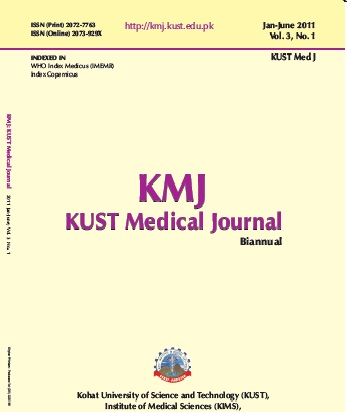KAP Regarding Handling, Storage, and Purification of Water among People Living in a Semi-Urban Community of Karachi, Pakistan
Main Article Content
Abstract
Objective: The aim of this study was to explore knowledge, attitude and practices of the people regarding handling, storage, and purification of water, in a semi -Urban community of Karachi, Pakistan
Methodology: This study was conducted in Lalabad community located in Bin Qasim Town from October 2007 to December 2007. Forty participants were sampled through convenience sampling, with the inclusion criterion of 6 months of residence in Lalabad community. Data was obtained using a structured questionnaire comprising of 35 questions related to knowledge, attitude and practices of handling, storage, and purification of water in a semi -Urban community of Karachi, Pakistan
Results: Out of the 40 participants, 29 (72.5%) were illiterate, whereas, 11 (27.5%) could read and write. All participants reported a scarcity of water resources in the community. Around 87.5% participants agreed that use of unpurified water can cause diseases. However, only 15% of the participants boiled water for drinking purposes, 12.5% shared that they used other methods for purification of water such as filter, alum and tablets. Almost 97.5% participants agreed that hand washing is very important for maintenance of health.
Conclusion: This data shows the knowledge, attitude and practices regarding the handling, storage, purification and use of water in semi -Urban community of Karachi, Pakistan. Effective interventions for community education and empowerment are needed to promote healthy practices regarding water sanitation.
Key words: water purification, water borne disease
Article Details
Work published in KMUJ is licensed under a
Creative Commons Attribution 4.0 License
Authors are permitted and encouraged to post their work online (e.g., in institutional repositories or on their website) prior to and during the submission process, as it can lead to productive exchanges, as well as earlier and greater citation of published work.
(e.g., in institutional repositories or on their website) prior to and during the submission process, as it can lead to productive exchanges, as well as earlier and greater citation of published work.
